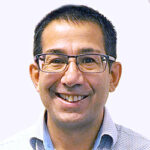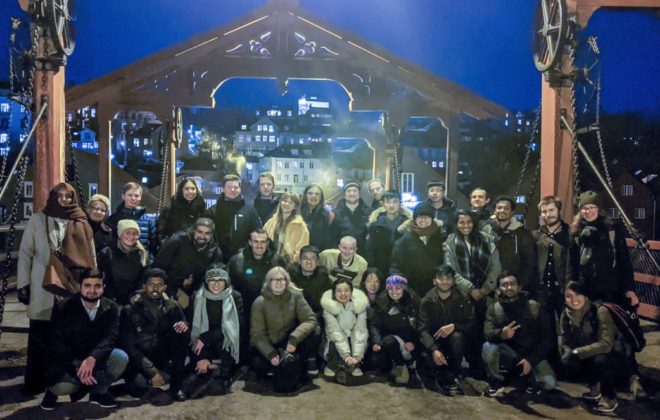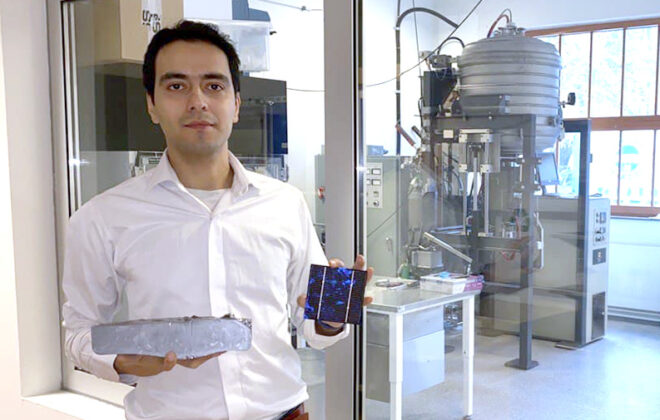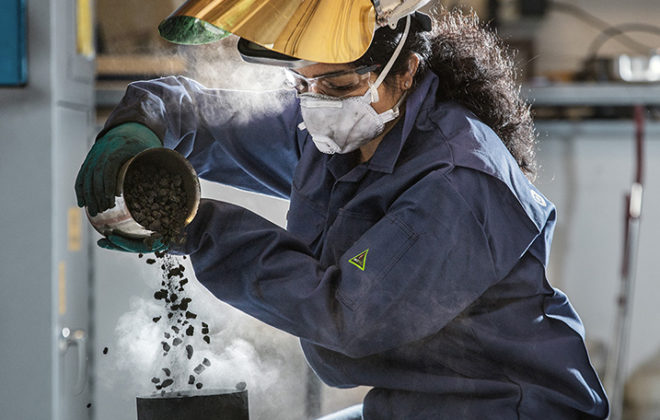A better, greener kind of electronics: Q&A with Julian Walker
 Julian Walker is a newly appointed associate professor in the Department of Materials Science and Engineering at NTNU.
Julian Walker is a newly appointed associate professor in the Department of Materials Science and Engineering at NTNU.
Originally trained as a Ceramic Engineer, he now develops functional materials based on engineered molecular crystals – crystalline solids that, like sugar, are formed from molecules held together by weak intermolecular forces.
Here he talks to NTNU Nano Director John de Mello about his research, interests and plans for the future.
How would you describe your research ‘in a nutshell’?
We develop new functional materials based on molecular crystals that are easier to process, use and recycle than conventional materials.
Can you give a couple of examples?
One example is piezo-electrics, materials that generate a voltage when they’re deformed or, alternatively, change shape when a voltage is applied across them. They have important applications as sensors and actuators. We also work with a sub-group of piezo-electrics known as ferro-electrics, which have a switchable electric polarisation. Roughly speaking, this means that one side of the ferro-electric crystal is positively charged and the other side is negatively charged. And we can control which side is which by applying a negative or positive voltage across the crystal. Ferro-electrics have a wide range of applications in electronics, including memory devices, temperature sensors and frequency filters for mobile phones.
How did you first get interested in your current research area?
I have a background in oxide-based materials, which have great piezo-electric and ferro-electric properties, but are rather brittle and require processing at high temperatures. Molecular crystals are mechanically flexible and chemically tuneable, which opens up a whole range of new applications in flexible and wearable electronics. They can also be processed at low temperatures, meaning their production is much less energy intensive and they’re compatible with current CMOS (complex metal oxide semiconductor) technologies. Until now, molecular crystals haven’t been widely investigated as piezo- and ferro-electrics, but they offer some really exciting opportunities for developing innovative technologies.
What was your last paper about?
We have a paper that’s currently under review on “plastic crystals”, which are molecular crystals where the position of the molecules is highly ordered (like in a conventional crystal) but their orientation is disordered (like in a liquid). Hence, they lie somewhere between fully ordered crystals and fully disordered liquids. In this respect they’re the counterpart to liquid crystals, where the orientation is ordered but the position is disordered. By carrying out a fairly comprehensive range of measurements at the European Synchrotron Radiation Facility (ESRF) in Grenoble, we have shown how orientational disorder in plastic crystals affects their macroscopic properties like electronic conductivity and the enthalpy of phase transitions. This insight will hopefully allow us to engineer better materials in the future.
Why did you choose NTNU?
I first joined NTNU as a post-doc three years ago, working with Mari-Ann Einarsrud in the FACET group at the Department of Materials Science and Engineering. I had met quite a few of the FACET team members over the years, and was very familiar with their work in ceramics and ferroics. They contacted me to tell me about an opening in their group, which I applied for and was fortunate enough to get. One of the things I really liked about the job was the freedom I was given to pursue my own research interests. In fact, the only strict instruction I received was that I should find something to work on that no other member of the FACET group was doing! I can’t overstate how valuable it is having that kind of academic freedom at an early stage of your career. Having moved here from the US, I have come to really value the excellent work-life balance in Norway. So, when a vacancy for an associate professor arose within the Department, I jumped at the chance to apply, and here I am!
Where do you carry out most of your research?
A lot of it is done within the department, and within the FACET group facilities in particular. I also make heavy use of the European Synchrotron Radiation Facility. I’m planning to start working on thin-film molecular crystals in the near future, and much of the fabrication work for that is likely to take place in NTNU NanoLab.
What do you most enjoy about your work?
I love the diversity of the job. The fact that I can be in the lab carrying out experiments one minute, and then sitting in my office working through some complicated theory the next. I really enjoy teaching too, especially the challenge of explaining fundamental concepts in easily understood ways. The constant alternation between mentoring others and learning completely new stuff myself is hugely rewarding.
Is there anything in particular you’re looking forward to in the coming year?
Absolutely! Next year, the first PhD student will join my group to work on a new project in supramolecular ferroics for efficient and recyclable electronics. The advert is out at the moment with a deadline of 31st December, so there’s still time to apply! You can find more details here: https://tinyurl.com/6f4z29sf
What motivates your work?
Curiosity. Finding out new things. And solving the global e-waste crisis. Over fifty million tonnes of electronic waste are discarded each year, and the problem is just getting worse. Because of our throw-away attitude to electronics, e-waste is the fastest growing form of land-fill waste. In many cases, there’s a higher percentage of valuable resources in discarded electronics than in the original one, so it’s ridiculous we still don’t make a serious effort to recycle properly. A lot of the materials I work on are soluble, so in principle you should be able to dissolve them at the end of their useful life to recover any scarce resources.
What do you do in your spare time?
Read and run. I used to do a lot of road marathons but, since coming to Trondheim, I’ve gradually transitioned to trail running in Bymarka and beyond. I grew up in Sydney and have spent a lot of time in other big cities, but I really like being in a smaller city now, where I can be out in the country in ten minutes.
What are your plans for the future?
After nearly ten years of moving from country to country, it feels good to be settling down. I’ve recently bought a house, and I’m looking forward to building a life in Trondheim.

John de Mello
John de Mello is the Head of NTNU Nano. He is also a professor at the Department of Chemistry.
Search
Søk
Categories
- Arctic Research
- Arkitektur
- Bærekraft
- Bioingeniørfag
- Biologi
- Biology
- Biomedical Laboratory Science
- Biotechnology
- Bioteknologi
- Chemical Engineering
- Chemistry
- Climate
- Computer Science
- Datateknologi
- Digital
- Elektronikk
- Energi
- Energi
- Energy
- Engineering
- Engineering
- Environment
- Food Science
- Forskning
- Fysikk
- Fysikk
- Havbruk
- Informasjonsteknologi
- Informasjonsteknologi
- Ingeniørvitenskap
- Kjemi
- Kjemisk prosessteknologi
- Kjemisk prosessteknologi
- Kreftbehandling
- Kybernetikk
- Marine Technology
- Materialer
- Materials Science
- Materialteknologi
- Matvitenskap
- Meninger
- Miljø
- Min ph.d.
- My PhD
- My PhD
- My postdoc
- Nanotechnology
- Nanoteknologi
- Ocean
- Oil and gas
- Physics
- Research
- Simulering og visualisering
- Spør en forsker
- Studentliv
- Sustainability
- Ukategorisert
- Universitetsliv
- University Life
Kategorier
- Arctic Research
- Arkitektur
- Bærekraft
- Bioingeniørfag
- Biologi
- Biology
- Biomedical Laboratory Science
- Biotechnology
- Bioteknologi
- Chemical Engineering
- Chemistry
- Climate
- Computer Science
- Datateknologi
- Digital
- Elektronikk
- Energi
- Energi
- Energy
- Engineering
- Engineering
- Environment
- Food Science
- Forskning
- Fysikk
- Fysikk
- Havbruk
- Informasjonsteknologi
- Informasjonsteknologi
- Ingeniørvitenskap
- Kjemi
- Kjemisk prosessteknologi
- Kjemisk prosessteknologi
- Kreftbehandling
- Kybernetikk
- Marine Technology
- Materialer
- Materials Science
- Materialteknologi
- Matvitenskap
- Meninger
- Miljø
- Min ph.d.
- My PhD
- My PhD
- My postdoc
- Nanotechnology
- Nanoteknologi
- Ocean
- Oil and gas
- Physics
- Research
- Simulering og visualisering
- Spør en forsker
- Studentliv
- Sustainability
- Ukategorisert
- Universitetsliv
- University Life



